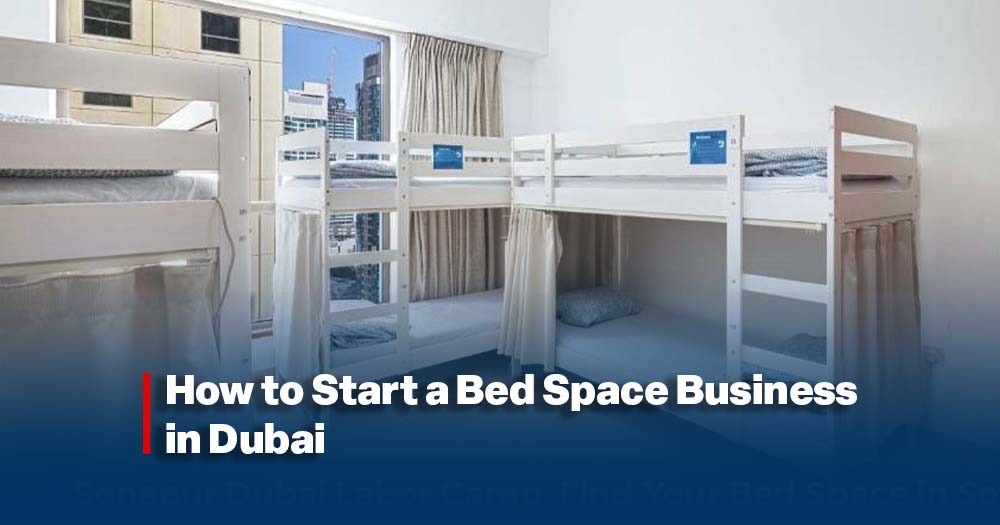Bed space business in Dubai is growing fast as housing costs rise, with demand for shared living increasing by 15% in recent years. But is it legal? How much does it cost, and what approvals are required? This guide explains everything—licenses, documents, approvals, benefits, costs, and setup time—so you understand the full process. Ready to see if starting a bed space business in Dubai is the right move for you?
Table of Contents
Toggle- What exactly is a bed space business?
- Is the Bed Space Business Legal in Dubai, and What are the Risks of Non-Compliance?
- Key Legal Requirements
- What Licenses Are Required for a Bed Space Business in Dubai?
- What Documents Are Needed for a Bed Space Business License?
- What Approvals Are Required for a Bed Space Business in Dubai?
- Why Partition Businesses Are Common Despite Being Illegal
- Who Benefits Most from a Bed Space Business?
- Where Are the Best Areas for a Bed Space Business in Dubai?
- Steps to Start a Bed Space Business in Dubai
- How Much Does It Cost to Start a Bed Space Business in Dubai?
- How Long Does It Take to Start a Bed Space Business in Dubai?
- Summary
- FAQ’s
What exactly is a bed space business?
A bed space business involves renting individual beds in shared rooms, rather than entire apartments. This model works well in expensive cities like Dubai, where housing costs are high. Tenants, often workers or students, save money while landlords earn more by renting out multiple beds in a single room. However, strict rules apply. You need the correct license and must follow safety and occupancy laws. Managed legally, it provides affordable housing and a steady, reliable income stream.
Is the Bed Space Business Legal in Dubai, and What are the Risks of Non-Compliance?
Yes, the bed space business is legal in Dubai if you meet all requirements. You must get a trade license from the Department of Economic Development, Dubai Municipality approval, and Civil Defense clearance for safety.
The landlord must give written consent, and every tenant must be registered on Ejari. Without these steps, the business is illegal and can lead to heavy fines, eviction, and even utility disconnection.
Key Legal Requirements
- Landlord approval is mandatory. Without it, subleasing is not valid.
- Ejari registration must include all tenants. Missing names break the law.
- Licenses and permits from DED and Dubai Municipality are required.
- No illegal partitions are allowed. Unapproved walls or wooden dividers are unsafe and banned.
- Occupancy limits apply. Too many tenants per flat is not permitted.
- Health and safety rules must be followed. Fire exits, sanitation, and ventilation are essential.
Rules and Risks
|
Rule |
Requirement |
Risk if Ignored |
|
Landlord Consent |
Written approval |
Contract void, eviction |
|
Ejari |
All tenants listed |
Legal breach, fines |
|
Licensing |
DED and municipal permits |
Business closure, penalties |
|
Partitioning |
No unapproved dividers |
Eviction, unit blacklisted |
|
Safety Standards |
Fire, sanitation, occupancy |
Liability, tenant danger |
Risks of Non-Compliance
- Fines between AED 10,000 and AED 100,000.
- Eviction of tenants without notice.
- Utility disconnection by DEWA for illegal setups.
- Blacklisting of repeat offenders, plus possible court action.
- Partitioning can weaken the building structure and break fire or health codes, creating serious risks to residents’ safety.
So, the model is legal only when every rule is met. With proper approvals, Ejari registration, and safe housing standards, shared living can be allowed. But if you skip these steps, the risks are severe.
What Licenses Are Required for a Bed Space Business in Dubai?
A bed space business cannot operate freely without proper approvals. Authorities treat unlicensed setups as illegal. Therefore, to stay safe, you must secure the right licenses. Without them, you risk fines, eviction, or closure. Below are the key requirements.
Licenses and Permits You Must Have
1. DED Trade License
- issued by Dubai’s Department of Economic Development.
- It must cover rental or shared housing activity.
2. Landlord’s NOC
- Written approval from the property owner if you are not the owner.
3. Ejari Registration
- Every tenant must be listed in Ejari for legal tenancy.
4. Municipality Approval
- Zoning clearance to confirm the property is in an area where shared housing is allowed.
5. Civil Defense and Safety Clearance
- Covers fire exits, alarms, sanitation, and occupancy checks.
6. Building or Partition Permit
- Required if you make changes like partitions or room divisions.
7. Utility Registration (DEWA)
- Ensures water and electricity use is registered legally.
License vs Risk If Missing
|
License / Permit |
What It Requires |
Risk If Missing |
|
DED Trade License |
Legal rental activity |
Heavy fines, business shut down |
|
Landlord’s NOC |
Written owner approval |
Contract void, possible eviction |
|
Ejari Registration |
All tenants listed in Ejari |
Invalid tenancy, fines, eviction |
|
Municipality Approval |
Zoning clearance for shared housing |
Illegal use, property closed |
|
Civil Defense Approval |
Fire, sanitation, and occupancy safety |
Fire risk, safety violations, shutdown |
|
Partition Permit |
Legal permission for structural work |
Fines, eviction, unsafe living conditions |
|
Utility Registration |
Legal water and electricity supply |
Disconnection, penalties, legal action |
So, a bed space business is legal only if all licenses are in place. With proper approvals, you reduce risks and build trust. Without them, you face eviction, fines, and closure.
What Documents Are Needed for a Bed Space Business License?
Getting a bed space business license in Dubai requires a specific set of documents. Your application will be rejected if any are missing, leading to delays or penalties. You need to prove your property, contracts, and safety standards are fully legal. Here’s the complete list you must prepare.
9 The Essential Document Checklist
- Trade Name Reservation: From the DED. This locks in your business name.
- Initial DED Approval: This greenlights the official licensing process.
- Ejari-Registered Tenancy Contract: The property and all tenants must be registered in this system.
- Landlord NOC (No Objection Certificate): Written permission from the property owner is mandatory.
- Passport & Emirates ID Copies: For all business owners/partners.
- Memorandum of Association (MOA): If you have business partners.
- Municipality & Civil Defense Certificates: These confirm the property meets zoning, fire safety, and occupancy rules.
- Floor Plan and Property Photos: To show the layout, exits, and overall condition for inspections.
- Payment Receipts: Proof that all government fees have been paid.
Why Each Document Matters
|
Document |
Why It’s Needed |
Risk if Missing |
|
Ejari Contract |
Legally registers the tenancy |
Fines, invalid contract |
|
Landlord’s NOC |
Confirms you can use the property for this business |
Eviction, legal disputes |
|
Civil Defense Certificate |
Proves the property is safe from fire hazards |
Immediate shutdown, legal penalties |
|
Municipality Approval |
Verifies the property is in a zone that allows shared housing |
Business closure |
Your license application depends on having every single one of these documents ready. With them, the process can be smooth. Without them, you risk serious financial and legal trouble. Proper preparation is the key to starting your business legally and successfully.
What Approvals Are Required for a Bed Space Business in Dubai?
To run a bed space business in Dubai, you need several approvals. Authorities focus on safety, tenancy, and property use. If even one is missing, your license may be delayed, rejected, or cancelled. Below is the complete list.
9 Essential Approvals
1. DED Trade License
- Proves the business is legally registered.
- Without it, operations are illegal and subject to heavy fines.
2. Landlord’s No Objection Certificate (NOC)
- Needed if you do not own the property.
- Without it, contracts are void.
3. Ejari Registration
- Every tenant must be listed in Ejari.
- Missing names mean invalid tenancy and legal issues.
4. Dubai Municipality Zoning Approval
- Confirms the property is in a legal zone for shared housing.
- Without it, the unit may be closed.
5. Civil Defense Clearance
- Covers fire safety, alarms, ventilation, and occupancy rules.
- Without it, a shutdown is likely.
6. Building Safety Certificate
- Confirms compliance with sanitation and structural safety.
- Missing this causes inspection failure and penalties.
7. Building or Partition Permit
- Required if you create partitions or make changes inside the unit.
- Without it, fines apply.
8. Utilities Clearance (DEWA)
- Ensures water and electricity connections are legal.
- Without it, services may be cut.
9. Health and Sanitation Approval
- Verifies ventilation, hygiene, and waste systems meet Dubai standards.
- Without it, you risk penalties and tenant safety issues.
So, approvals are the backbone of a legal bed space business in Dubai. With trade licenses, Ejari, zoning, and safety clearances, you remain compliant and secure. Without them, you risk eviction, shutdown, and major financial loss.
Why Partition Businesses Are Common Despite Being Illegal
Partition businesses continue in Dubai even though the laws ban them. High rents and constant demand push both tenants and landlords into this model. Below are the main reasons why it remains widespread.
Key Reasons
- High rents make full apartments unaffordable. Therefore, many tenants settle for shared or partitioned rooms.
- Low-income workers receive limited pay. Thus, partitioned housing seems like the only choice.
- Landlords seek profit. Since more beds mean more rent per flat, temptation stays strong.
- Enforcement delays exist. Consequently, many illegal units run for months or even years without checks.
- Older areas face weaker monitoring. Accordingly, more partitioned flats continue to operate unnoticed.
- Limited affordable housing leaves a gap. As a result, shared setups fill that demand.
- Knowledge gaps matter. Many tenants assume such housing is legal due to a lack of awareness.
The bed space business may seem like a solution to high living costs, but risks outweigh short-term gains. Fines, eviction, safety hazards, and sudden utility cuts are common. Therefore, while demand continues, this model remains unsafe and unsustainable in the long run.
Who Benefits Most from a Bed Space Business?
A bed space business serves many groups in Dubai. Each group benefits differently, whether through lower costs, extra income, or flexible living. Below are the main beneficiaries and their key advantages.
1. Low-Income Workers
- They gain affordable rent. Since full flats cost much more, shared rooms help them save every month.
2. Students and Interns
- They benefit from budget housing. Because their income is limited, bed spaces allow them to live near schools or training centers.
3. Single Professionals
- They save money by sharing. Since many jobs are in city areas, shared housing cuts commuting and rent expenses.
4. Recent Job Seekers
- They get quick housing. Because many arrive without stable pay, bed spaces offer a short-term and affordable start.
5. People in Transition
- They find flexible contracts. Since some stay between jobs or relocations, shared housing suits temporary needs.
6. Expatriates
- They reduce living costs. Because apartments are expensive, many prefer smaller shared spaces to save for other expenses.
7. Landlords and Property Owners
- They increase income per unit. Since more tenants can stay in one property, monthly earnings often rise compared to a single lease.
8. Employers of Large Staff
- They save on bulk rentals. Because shared housing is cheaper, companies reduce staff housing costs and still meet legal housing standards.
9. Investors and Property Managers
- They see steady demand. Since affordable housing is always needed, managing multiple tenants ensures consistent returns.
Group vs Why They Benefit vs What They Gain
|
Group |
Why They Benefit |
What They Gain |
|
Low-Income Workers |
Flats are too expensive |
Affordable rent and monthly savings |
|
Students & Interns |
Limited budget for housing |
Low-cost and study-friendly accommodation |
|
Single Professionals |
Work near city areas |
Lower rent and less commuting |
|
Job Seekers |
Arrive without stable pay |
Temporary and quick housing |
|
People in Transition |
Moving jobs or cities |
Flexible contracts and short stays |
|
Expatriates |
High apartment costs |
Cheaper shared spaces and cost control |
|
Landlords / Owners |
More tenants per flat |
Higher monthly rental income |
|
Employers |
Bulk housing for staff |
Reduced accommodation expenses |
|
Investors / Managers |
Constant demand for cheap rooms |
Stable occupancy and steady returns |
So, the bed space business helps both tenants and landlords. Workers, students, and newcomers gain affordable options. At the same time, landlords, employers, and investors enjoy steady income. However, this business only works legally when all licenses, Ejari registrations, and safety approvals are in place. Without them, fines, eviction, or closure are common risks.

Where Are the Best Areas for a Bed Space Business in Dubai?
A bed space business succeeds most in locations where affordable housing demand is constant. In Dubai, workers, students, and professionals often look for shared spaces near jobs, schools, and transport. Choosing the right area reduces vacancies and ensures a steady income. Below are the top places where this model works best.
Best Areas for a Bed Space Business in Dubai
1. Deira
Popular with low-income workers. Because rents are lower, demand for shared rooms remains strong.
2. Bur Dubai
Close to offices, shops, and the metro. Therefore, it attracts professionals and students who want central yet affordable housing.
3. Al Qusais
Filled with industrial zones and staff accommodation. As a result, workers find it ideal for cheap living.
4. International City
Known for its affordable rents and large expat communities. Hence, it appeals to interns and job seekers.
5. Satwa
Located near trade hubs. Since many employees work nearby, demand for shared housing is constant.
6. Karama
Offers central access at mid-level rent. Thus, it suits young professionals and expatriates seeking balance.
7. Muhaisnah (Sonapur)
Surrounded by labor camps and factories. Because of this, it is one of the busiest spots for bed spaces.
8. Discovery Gardens & The Gardens
Affordable yet modern. Therefore, it appeals to expatriates who want budget-friendly housing with decent comfort.
9. Al Nahda
Popular among students and families on tight budgets. Since it is near schools and clinics, demand remains stable.
10. Al Quoz
Located near industrial jobs. Hence, workers choose it for low rent and transport access.
11. Al Barsha
Balanced prices with malls, schools, and metro links. Therefore, it attracts students and mid-income professionals.
12. Jumeirah Lake Towers (JLT)
Metro access and a business hub. Thus, it suits commuters willing to pay slightly more.
13. Dubai Marina
Though pricier, professionals pay for lifestyle and proximity to work. Good for premium shared units.
So, the best areas for a bed space business in Dubai are those with strong demand, affordable rent, and transport access. Places like Deira, Bur Dubai, and Al Qusais offer high occupancy. Meanwhile, areas such as JLT and Dubai Marina serve professionals willing to pay more. However, every location requires approvals, Ejari, Civil Defense, and DED licensing to remain legal and avoid penalties.
Steps to Start a Bed Space Business in Dubai
Starting a bed space business in Dubai can be rewarding, but success depends on following the correct process. Housing demand is high, yet strict rules apply. Therefore, careful planning, full approvals, and legal compliance are essential. Missing even one step can cause fines, eviction, or closure. Below is a clear guide.
Step-by-Step Guide
- Do market research: Study demand near metro lines, schools, or job hubs. This reduces the risk of vacancies.
- Write a business plan: Set a budget, rent rates, and income goals. Clear planning helps control costs.
- Choose the jurisdiction: Decide between the mainland and the free zone. Each has different license rules and costs.
- Reserve a trade name: Apply with the Department of Economic Development (DED). Every license needs a unique identity.
- Apply for initial approval: DED must confirm your activity before moving forward.
- Secure a tenancy contract: Register your property with Ejari. Without it, your setup is not legal.
- Get the landlord’s NOC: Written approval is mandatory. Without it, contracts can be void.
- Submit passport and Emirates ID copies: Required for all owners or partners.
- Prepare a floor plan: Mark exits, bathrooms, and shared areas. Authorities use this during inspections.
- Obtain zoning and municipality approval: Confirms the property is in a legal area for shared housing.
- Get Civil Defense clearance: Fire alarms, exits, and emergency systems must be in place.
- Provide sanitation and safety certificates: Prove ventilation, hygiene, and building safety.
- Pay government fees: Keep receipts. An incomplete payment can block your license.
- Market your business: Use online listings, social media, and referrals.
- Maintain property and renew licenses: Regular cleaning, repairs, and renewals keep the business legal and profitable.
Essential Steps vs Why They Matter vs Risk If Skipped
|
Step |
Why It Matters |
Risk If Skipped |
|
Market Research |
Finds demand and the best location |
Vacancies, wasted investment |
|
Business Plan |
Sets budget, rent rates, and growth strategy |
Poor planning, unstable income |
|
Trade License (DED) |
Legal approval to operate |
Business shut, heavy fines |
|
Ejari Tenancy Contract |
Registers property and tenants legally |
Invalid tenancy, legal disputes |
|
Landlord’s NOC |
Confirms legal use of the property |
Eviction, contract void |
|
Municipality & Zoning |
Confirms shared housing is allowed in the area |
License rejection, property closure |
|
Civil Defense Clearance |
Ensures fire safety and emergency standards |
Shutdown, safety violations |
|
Sanitation Certificates |
Proves hygiene and ventilation compliance |
Health risks, penalties |
|
Tenant Contracts |
Sets clear rules and deposits |
Disputes, tenant turnover |
|
Marketing & Maintenance |
Attracts tenants and keeps them satisfied |
Empty rooms, bad reputation |
So, a bed space business in Dubai only succeeds when every step is complete. From market research to Civil Defense clearance, each stage protects your investment. With proper approvals, safe property, and tenant care, you secure a steady income and avoid penalties. But if you skip steps, risks like fines, eviction, and closure follow quickly.
How Much Does It Cost to Start a Bed Space Business in Dubai?
Starting a bed space business in Dubai is a promising idea, but costs vary depending on setup, size, and location. While some investors prefer a low-budget entry, others choose a mid-scale or premium setup for higher returns. Below is a detailed breakdown that shows what to expect at each stage.
Cost Breakdown for Starting a Bed Space Business in Dubai
|
Expense Category |
Budget Setup (AED) |
Mid-Scale Setup (AED) |
Premium Setup (AED) |
Why It Matters |
|
Trade License & Approvals |
10,000 – 15,000 |
15,000 – 20,000 |
20,000 – 25,000 |
Legal foundation for operation |
|
Ejari Registration & NOC |
3,000 – 5,000 |
5,000 – 7,000 |
7,000 – 10,000 |
Confirms legal tenancy rights |
|
Property Rent (Annual) |
40,000 – 60,000 |
70,000 – 120,000 |
150,000+ |
Biggest cost: varies by area |
|
Furnishing & Interiors |
20,000 – 40,000 |
50,000 – 80,000 |
100,000+ |
Comfort attracts long-term tenants |
|
Fire & Safety Installations |
10,000 – 20,000 |
25,000 – 35,000 |
50,000+ |
Civil Defense approval required |
|
Utilities & DEWA Connection |
5,000 – 10,000 |
10,000 – 15,000 |
15,000 – 20,000 |
Essential for daily operations |
|
Marketing & Advertising |
5,000 – 8,000 |
10,000 – 15,000 |
20,000+ |
Fills vacancies quickly |
|
Miscellaneous & Buffer |
5,000 – 10,000 |
10,000 – 15,000 |
20,000+ |
Covers surprise costs |
Estimated Total Investment:
- Budget Setup: AED 100,000 – 160,000
- Mid-Scale Setup: AED 200,000 – 300,000
- Premium Setup: AED 400,000+
Key Takeaways
- Budget setups suit small investors targeting workers or students in affordable areas.
- Mid-scale setups work best in central hubs like Karama, Bur Dubai, or Al Nahda.
- Premium setups attract professionals in JLT, Dubai Marina, and other high-demand zones.
The cost of starting a bed space business in Dubai depends on location, property type, and compliance. While a basic model may need as little as AED 100,000, a premium setup can go well beyond AED 400,000. However, skipping approvals or safety measures risks fines, eviction, or closure. Done right, this business offers steady demand, strong returns, and a secure path to long-term income.
How Long Does It Take to Start a Bed Space Business in Dubai?
The time to start a bed space business in Dubai depends on approvals, compliance, and how prepared your documents are. While demand for affordable housing is high, delays often happen when zoning, safety, or paperwork requirements are not met. On average, the full process may take one to three months. Below is a detailed timeline with possible delays.
Timeline to Start a Bed Space Business in Dubai
Market Research & Planning
1 to 2 weeks. Delays happen if you choose areas without strong housing demand.
Choosing Jurisdiction & Location
1 to 2 weeks. Mainland or free zone choice adds time if rules differ.
Trade Name Reservation
1 to 2 working days. Missing papers or duplicate names can delay approval.
Initial Approval (DED)
3 to 7 days. Delays occur if the activity selected is unclear.
Ejari Tenancy Contract
1 to 3 days. Faster online, but errors in contracts can push it longer.
Landlord’s NOC
1 to 7 days. Some landlords respond quickly; others take longer.
Municipality & Zoning Approval
5 to 14 days. Extra checks apply if the property is not in an approved zone.
Civil Defense Clearance
7 to 21 working days. Safety issues or required changes can extend this step.
Sanitation & Safety Certificates
1 to 2 weeks. Ventilation or hygiene gaps may cause re-inspections.
Furnishing & Setup
1 to 3 weeks. Depends on contractors, furniture supply, and property condition.
Final License Issuance
5 to 10 days. Missing fees or incomplete files may delay the license.
Step vs Typical Timeline vs Common Delays
|
Step |
Typical Timeline |
Common Delays |
|
Market Research & Planning |
1–2 weeks |
Poor data, unclear budget |
|
Jurisdiction & Location Choice |
1–2 weeks |
Wrong jurisdiction, area not allowed |
|
Trade Name Reservation |
1–2 days |
Duplicate names, missing documents |
|
Initial Approval (DED) |
3–7 days |
Wrong activity selection |
|
Ejari Tenancy Contract |
1–3 days |
Errors in the lease, missing details |
|
Landlord’s NOC |
1–7 days |
Slow landlord approval |
|
Municipality/Zoning Approval |
5–14 days |
Property not zoned for shared use |
|
Civil Defense Clearance |
7–21 days |
Safety changes, long inspections |
|
Sanitation Certificates |
1–2 weeks |
Hygiene or ventilation issues |
|
Furnishing & Setup |
1–3 weeks |
Supply delays, contractor issues |
|
Final License Issuance |
5–10 days |
Missing fees, incomplete paperwork |
So, starting a bed space business in Dubai usually takes 4 to 8 weeks when everything is prepared. Yet, if documents are missing or safety approvals face delays, it can extend to 10 to 12 weeks. Therefore, planning ahead, ensuring compliance, and choosing the right property will save time and reduce risks of rejection.
Summary
Starting a bed space business in Dubai requires careful planning, legal approvals, and steady compliance. While the demand is high, missing permits or safety checks can lead to heavy fines or closure. Business LinkUAE makes the process easier with expert support in company registration, trade licensing, and visa services. So, instead of dealing with delays, call Business Link today and start your business journey the right way.
Call our team today via phone at +97143215227, WhatsApp at +971502052735, or email at connect@businesslinkuae.com and get clear answers, expert advice, and hands-on help so you can attend your appointment fully prepared and confident.
FAQ’s
Is subletting bed spaces without Ejari legal in Dubai?
No. Every tenant must appear on the Ejari contract. Without it, the setup is illegal.
Do I need a trade license to run a bed space business?
Yes. A trade license from the Department of Economic Development (DED) is mandatory. Without it, you risk heavy fines and closure.
Can landlords allow bed spaces if they agree?
Yes, but only with written approval and Ejari registration. Without both, the arrangement is not valid.
Are partitions inside flats allowed in Dubai?
Only if approved by the Dubai Municipality and Civil Defense. Otherwise, partitions are illegal.
What are the penalties for running an illegal bed space business?
Fines can reach AED 100,000. In addition, authorities may order eviction and disconnect utilities.
What is the minimum cost to start a bed space business in Dubai?
The starting cost is around AED 35,000. This usually covers trade license, approvals, and basic furnishing.
How long does it take to get a trade license?
On average, 1 to 2 weeks if your documents are complete and approvals are in place.
What causes the biggest delays in starting a bed space business?
Civil Defense clearance and zoning approvals often take the most time, especially if safety upgrades are required.
How long does it take to fully launch a bed space business?
Most setups take 30–60 days. If there are safety or zoning issues, it can extend to 90 days.
How can I avoid delays in getting approvals?
Prepare documents early, select a property already zoned for shared housing, and work with an experienced PRO.
What happens if I ignore the bed space rules in Dubai?
Expect fines, eviction, and even disconnection of utilities if you operate without compliance.




